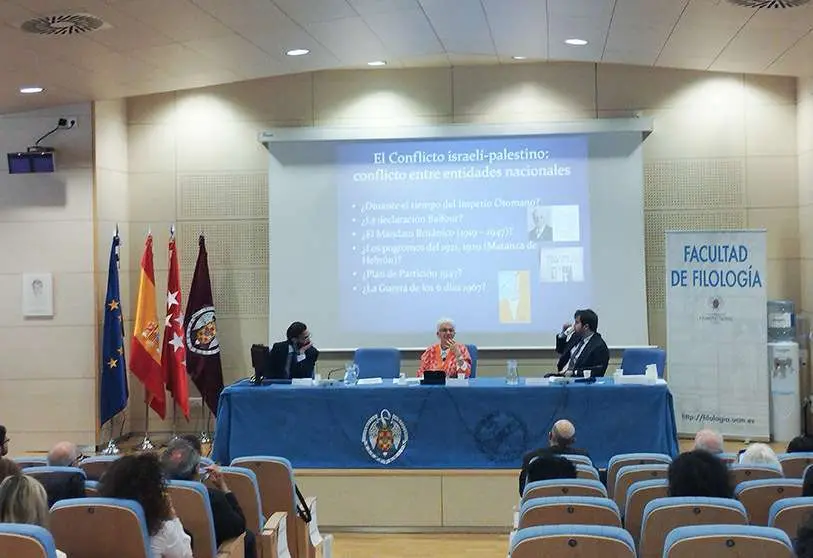The Oslo Accords: A commemoration

It is almost thirty years since that iconic image was taken at the White House. Israeli Prime Minister Yitzhak Rabin shook hands with a smiling leader of the Palestine Liberation Organisation (PLO), Yasser Arafat, under the embrace of the intermediary Bill Clinton, then President of the United States. There is much to be gleaned from this 1996 image. The accords, which boasted the name of the Norwegian capital, were signed in Washington, and the "just, lasting and comprehensive" peace they promised did not come either. In fact, quite the opposite happened. The two protagonists of that historic moment were assassinated, although in Arafat's case it was a death under suspicion.
It is almost thirty years since that image, and the question posed by the forum organised by the Faculty of Philology of the Complutense University of Madrid is: What has changed for Palestine and Israel since the Oslo Accords? On 7 and 8 February, the Faculty's auditorium hosted an intellectual forum to debate the Palestinian-Israeli question under the title "The Oslo Accords: a commemoration".
The words chosen by the professors who organised the event, David Villar Vegas and Jordan Spencer Jacobs, are not whimsical because the Oslo Accords were anything but a celebration. "Oslo is a framework agreement and a window of hope, but it is a mistake to treat it as a peace agreement. There is nothing to celebrate," argues Hunsi Abdel Wahed, the Palestinian ambassador to Spain.
However, they were possible agreements, and they were possible because of the change of paradigm that was taking place on the international scene, the same paradigm that later made them impossible. "I remember my trip to the West Bank in 1995 as a friendly, post- Olso Accords scenario. The next time I was there, in 2019, it was all difficulties," Enrique Guerrero Salom, former member of the European Parliament for the PSOE and professor in the Department of Political Science and Administration, recounts in his first speech.

The fall of the USSR, the transformations towards democracy and even Clinton's political programme on the Mandate for Change could have provided a very favourable scenario for Oslo. The Madrid Peace Conference itself in 1991 was the preliminary step towards agreements. A first attempt by the international community to start a peace process between Israel, the Palestine Liberation Organisation (PLO), Syria, Lebanon and Jordan.
In the words of Israel's ambassador, Rodica Radian-Gordon, Madrid was synonymous with "efforts to reach agreements between Israel and its neighbours".
However, the Oslo Accords promised to be much more difficult than Madrid. The signing agreed to the division of the West Bank and Gaza Strip into three areas, Israel's recognition of the PLO as representative of the Palestinian people, but the most contentious issues - Jerusalem, borders, settlements - were left unresolved in the already stalled talks. The turning points were many. Rabin's assassination, Ariel Sharon's provocation and the sight of the Esplanade of the Mosques and the start of the Second Intifada were key.

"That was the beginning of the backlash. That same fundamentalist right wing a few years later assassinated Arafat, the other architect of Oslo, with polonium, a radioactive substance to which few have access. Bush gave the green light to eliminate Arafat". Says the Palestinian ambassador. Hunsi Abdel Wahed also lamented the emergence of groups like Hamas. "It is my enemy," he said, "but it is also Israel's responsibility, not just Palestine's. Israel has handed over the Strip to Hamas. Israel has handed over the Strip to Hamas and did not talk to the Palestinian authority".
Both Abdel Wahed and Radian-Gordon agreed in their speeches - on separate days - that Hamas was disrupting peace processes. "Hamas does not recognise Israel or the agreements signed with Palestine. There is a conflict of interest between them", the Israeli ambassador said. The Islamist group won the first parliamentary elections in Palestine in 2006 and since then the elections have been a matter of conflict for both sides. "Democracy is only for some. The Palestinian people were punished for the victory of Hamas, not their MPs as they should be. I am not defending Hamas but the vote of my people", said the Palestinian ambassador. However, for the ambassador, the reason for not holding elections is "because the Palestinian leadership is afraid of losing its power".

Almost thirty years after the Oslo Accords, the sense of peace is still far away and is not detached from its international context. Abdel Wahed himself compared the invasion of Ukraine to the Israeli settlers. "The day after the invasion, sanctions were applied. The Ukrainians do have the right to armed struggle, the Palestinians do not". But the responsibility for the failure to follow through on agreements remains, for Radian Gordon, with the Palestinian leadership, whom he accuses of "being more interested in winning international support than in negotiating, reaching understandings and seeking a solution".
Trump's recognition of Jerusalem as the capital of Israel led Mahmoud Abbas, president of the Palestinian Authority, to suspend relations with Washington and to stop considering the United States as the sole mediator in this conflict. The international scene is a far cry from the one that Oslo envisioned.
The undeniably difficult question that underlies each of the interventions is whether the Oslo Accords remain a current margin for negotiation or whether new ones need to be created? The future is inconceivable, but there is more pessimism than optimism in the Middle East," laments Rodica Radian-Gordon. Perhaps it is forums for debate of this kind that help, even if, like this one, they are broken up by violent demonstrators at the gates of the auditorium itself, shouting "Assassins! "This is violence," comment the young organisers of the event.
The "Olso Accords: a commemoration" was another step towards the desire and dream of achieving peace between Israel and Palestine. A peace that was dreamt of 30 years ago.









